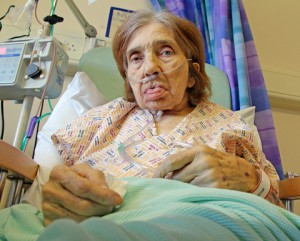Referral guidelines & summary
Referral guidelines
If AKI is diagnosed it may be important to decide if management in primary care is appropriate and, if referral is necessary, to which team.
NICE recommend use of the KDIGO classification of AKICR2:
- AKI 1: A rise in creatinine of =26.5 µmol/l OR 1.5-1.9 times baseline
- AKI 2: A rise in creatinine of 2.0-2.9 times baseline
- AKI 3: A rise in creatinine of 3 or more times baseline OR increase in creatinine to =353µmol/l.
This guides referral as patients with AKI 1 may often be managed safely in the community, although close follow up will be required with early repeat of creatinine and monitoring of potassium. Admission to general medicine is appropriate for many patients with AKI 2 as intravenous fluid replacement is likely to be needed and the underlying precipitating cause is likely to require in patient treatment. Furthermore, admission facilitates close monitoring of renal function. However, as management predominantly requires treatment of the underlying disease, not specialist nephrology input, referral directly to the renal unit is most often not needed.
Finally, in keeping with the KDIGO guidelines on AKI, the NICE AKI Clinical Guideline (CG169) suggests discussion of management of AKI with a nephrologist or paediatric nephrologist as soon as possible and within 24h of detection when one or more of the following is present:
- A possible diagnosis that may need specialist treatment (for example vasculitis, glomerulonephritis, tubulointerstitial nephritis or myeloma)
- AKI with no clear cause
- Inadequate response to treatment
- Complications associated with AKI
- Stage 3 AKI
- A renal transplant
- CKD stage 4 or 5
Acute glomerulonephritis, vasculitis, interstitial nephritis and thrombotic thrombocytopenic purpura/haemolytic uraemic syndrome (TTP/HUS) are ‘must not miss’ diagnoses. These diagnoses will be suggested by the history and examination findings and will always be associated with abnormal urinalysis. Thus, dipstick of the urine is mandatory in patients who may have AKI due to intrinsic renal disease, the finding of haematuria and/or proteinuria requiring discussion with a nephrologist within 24 hours.
In patients suspected of having bladder outlet obstruction as the primary cause of AKI, referral directly to urology may be appropriate, depending on the severity of the AKI.
Sick day rules
It has been suggested that use of ‘Sick Day Rules’ for patients at risk of AKI is central to reducing the incidence of AKI (58, 87). The most important aspect of these rules is informing at risk patients of the need to attend surgery if unwell.

Summary
Perhaps the most important message is ‘Think Kidney’ as recently encouraged for diabetes. This requires recognition of the patient at risk of AKI and a low threshold for measuring serum creatinine and stopping medications that may exacerbate AKI. It is important also that the patient is educated about risks of AKI and informed that they should attend the surgery if any recognised triggers for AKI supervene.
Consultation check list
- Recognise at risk patient
- Recognise clinical triggers for AKI
- Be aware of history suggestive of intrinsic renal disease or obstruction
- If AKI suspected:
- Assess for and correct hypovolaemia (may require admission)
- Exclude infection
- Identify and stop nephrotoxic medication
- Identify and stop medications that may accumulate in AKI
- Check plasma/serum creatinine
- Perform urinalysis
- Refer as appropriate

